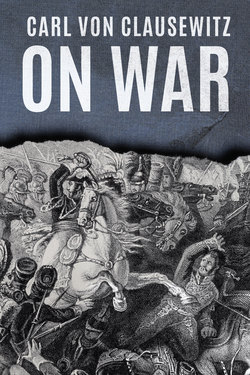Читать книгу On War - Carl von Clausewitz - Страница 45
На сайте Литреса книга снята с продажи.
ОглавлениеWe must, however, here guard ourselves against a mistake. In certain cases these subjects may be really of decisive importance. The distance of hospitals and depôts of munitions may very easily be imagined as the sole cause of very important strategic decisions. We do not wish either to contest that point or to throw it into the shade. But we are at present occupied not with the particular facts of a concrete case, but with abstract theory; and our assertion therefore is that such an influence is too rare to give the theory of sanitary measures and the supply of munitions and arms an importance in theory of the conduct of War such as to make it worth while to include in the theory of the conduct of War the consideration of the different ways and systems which the above theories may furnish, in the same way as is certainly necessary in regard to victualling troops.
If we have clearly understood the results of our reflections, then the activities belonging to War divide themselves into two principal classes, into such as are only “preparations for War” and into the “War itself.” This division must therefore also be made in theory.
The knowledge and applications of skill in the preparations for War are engaged in the creation, discipline, and maintenance of all the military forces; what general names should be given to them we do not enter into, but we see that artillery, fortification, elementary tactics, as they are called, the whole organisation and administration of the various armed forces, and all such things are included. But the theory of War itself occupies itself with the use of these prepared means for the object of the war. It needs of the first only the results, that is, the knowledge of the principal properties of the means taken in hand for use. This we call “The Art of War” in a limited sense, or “Theory of the Conduct of War,” or “Theory of the Employment of Armed Forces,” all of them denoting for us the same thing.
The present theory will therefore treat the combat as the real contest, marches, camps, and cantonments as circumstances which are more or less identical with it. The subsistence of the troops will only come into consideration like other given circumstances in respect of its results, not as an activity belonging to the combat.
The Art of War thus viewed in its limited sense divides itself again into tactics and strategy. The former occupies itself with the form of the separate combat, the latter with its use. Both connect themselves with the circumstances of marches, camps, cantonments only through the combat, and these circumstances are tactical or strategic according as they relate to the form or to the signification of the battle.
No doubt there will be many readers who will consider superfluous this careful separation of two things lying so close together as tactics and strategy, because it has no direct effect on the conduct itself of War. We admit, certainly that it would be pedantry to look for direct effects on the field of battle from a theoretical distinction.
But the first business of every theory is to clear up conceptions and ideas which have been jumbled together, and, we may say, entangled and confused; and only when a right understanding is established, as to names and conceptions, can we hope to progress with clearness and facility, and be certain that author and reader will always see things from the same point of view. Tactics and strategy are two activities mutually permeating each other in time and space, at the same time essentially different activities, the inner laws and mutual relations of which cannot be intelligible at all to the mind until a clear conception of the nature of each activity is established.
He to whom all this is nothing, must either repudiate all theoretical consideration, or his understanding has not as yet been pained by the confused and perplexing ideas resting on no fixed point of view, leading to no satisfactory result, sometimes dull, sometimes fantastic, sometimes floating in vague generalities, which we are often obliged to hear and read on the conduct of War, owing to the spirit of scientific investigation having hitherto been little directed to these subjects.
